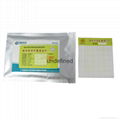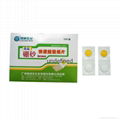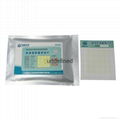| Model: | 32.8033 |
|---|---|
| Brand: | OASIS |
| Origin: | Made In China |
| Category: | Chemicals / Other Chemicals |
| Label: | count plate , food safety detect , rapid detection |
| Price: |
US $35
/ pc
|
| Min. Order: | 1 pc |
Product Description
1. Principle & application scope
Streptococcus faecium which widely exists in water is conditioned pathogen. It comes from the feces of human and warm-blooded animals. It can live in water for a long time and cause disease. As the important index to evaluate whether the water is contaminated by feces, it can objectively reflect the hygienic condition of water. Streptococcus faecium detecting board is a kind of disposable culture medium, which contains soluble bibulous gel and dehydrogenase indicator TTC. The streptococcus faecium shows red spots with yellow halo around. This product is suitable for the detection of streptococcus faecium in water and food.
Executive standard: National Standard of Methods for Examination of Drinking Natural Mineral Water (GB/T 8538); Construction of Cities and Towns Industry Standard of China (CJ/T 141~150); The Entry-Exit Inspection and Quarantine Industry Standard of China (SN/T 1933.1)
2. Using method
2.1 For water sample
2.1.1 Filtering of water sample: link the filtering device to the suction flask, clip the sterile filtering film of which the diameter is 47mm-50mm and pore diameter is 0.45μm with sterile tweezer, and place it at the bottle of filter, screw the lid tightly, then immit 250ml water sample into filter.
2.1.2 Uncover the upper film of the detecting board; moisten the filter paper of the detecting board with 1ml sterile water, then use a sterile tweezer to place the filter film on the filter paper with the bacteria side upturned. There should not be any bubble between filter film and filter paper. Then cover the upper film.
2.2 For food sample
2.2.1 Prepare the 1:10 solution by placing 25g or 25mL sample into 225mL sterile phosphate buffer solution or sterile saline, and homogenize them at 8000r/min for 1-2mins. According to the pollution level of sample, prepare solutions of tenfold increasing dilution ratios if necessary.
2.2.2 Uncover the adhesive label of the upper film of streptococcus faecium detecting board; use a sterile pipette to suck 1ml sample solution and drip it to the filter paper evenly, uncover the upper film quickly and shake the detecting board horizontally. Stand for about 10s until the sample solution was absorbed completely by the filter paper. Inoculate two detecting boards for each dilution ratio.
2.3 Culture
Superimpose the detecting boards together and place them upside down in the incubator for 15-24h in the temperature of 36℃±1℃.
3. Result
Streptococcus faecium shows red spots with yellow halo around after growing on the detecting board. It is negative result that the red spots are without yellow halo around.
4. Counting method
4.1 For water sample counting:Select the detecting boards of which the colony quantity is between 20CFU and 100CFU to do the counting. The result is the quantity of streptococcus faecium in per 250ml water sample. Use CFU/250ml as report unit.
4.2 For food sample counting:
4.2.1 Select the detecting boards of which the colony quantity is between 30CFU and 300 CFU to do the counting.
4.2.2 If there is just one diluted sample suitable for counting, calculate the average number of colonies on these detecting boards, and then multiply it by corresponding dilution multiple.The result is the quantity of streptococcus faecium in per gram or milliliter of sample.
4.2.3 If the colony quantities of two serial dilution ratio detecting boards are both between 30CFU and 300CFU, then calculate the number of streptococcus faecium by the following formula (1) :
∑C
N= ———————— •••••••••••••••••••(1)
(n1+0.1n2)d
In the formula:
N means the streptococcus faecium quantity of sample
∑Cmeans total quantity of streptococcus faecium on these two serial dilution ratio detecting boards
n1 means the quantity of detecting boards of which the dilution multiple is lower between these two serial dilution multiples.
n2 means the quantity of detecting boards of which the dilution multiple is higher between two serial dilution multiples.
d means the higher dilution ratio between these two serial dilution ratios.
For example:
|
Dilution ratio |
1:10 (the higher dilution ratio) |
1:100 (the lower her dilution ratio) |
|
colony quantity |
245,247 |
31,30 |
(245+247+31+30)
N= ———————— =2514
(2+0.1×2)×10-1
The result is 2.5×103CFU/g(mL)
4.2.4 If there is not any colony growing on the all dilution ratio detecting boards, report the result in terms of less than one multiplied by the minimum dilution multiple.
4.2.5 Estimate low value: If the colony quantity on two detecting boards of original sample (water and liquid beverage) or initial dilute suspension are both less than 30CFU, then calculate the average value of colony quantity on two detecting boards by below formula (2) :
∑C
NE = ——— •••••••••••••••••••(2)
nd
NE means estimated value of the colony quantity in per milliliter or gram sample.
∑C means total quantity of colony on two detecting boards.
n means the quantity of detecting boards.
d means the dilution ratio of original suspension or inoculated suspension.
4.2.6 Estimate high value: If the colony quantity on all dilution ratio detecting boards is more than 300CFU, then calculate the average value of colony quantity on the detecting boards which are most nearest 300CFU. Other detecting board can be recorded as TNTC. The formula (3) is :
∑C
NE = ——— •••••••••••••••••••(3)
nd
NE means the estimated value of the colony quantity in per milliliter or gram sample.
∑C means total quantity of colony on two detecting boards.
n means the quantity of detecting boards.
d means the corresponding dilution ratio of the sample suspension.
5. Report
Use CFU/g as report unit for solid sample, and use CFU/mL as report unit for liquid sample.
6. Additional explanatory note
Dispose the used detecting boards according to the biology safety waste treamentl rule, because there are live bacteria on them.
Member Information
| Guangdong Dayuan Oasis Food Safety Technology Co.,Ltd | |
|---|---|
| Country/Region: | Guang Dong - China |
| Business Nature: | Manufacturer |
| Phone: | 13745444520 |
| Contact: | Phoebe Zhang (Executive of Foreign) |
| Last Online: | 17 Mar, 2017 |







